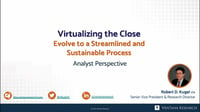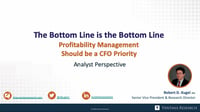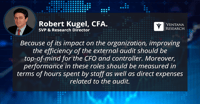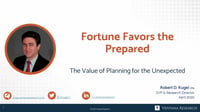The global pandemic crisis was, in effect, an unrehearsed stress test measuring the resiliency of the department. The crisis highlighted the importance of sustaining confidence in the accuracy and control of accounting processes, not just efficiency. Virtualizing the close means using technology to substantially reduce the amount of manual processing and paper involved needed to complete the accounting close. Finance and accounting organizations that can operate in a virtual mode are better...
Read More
Topics:
Office of Finance,
Continuous Accounting,
Fast close,
CFO
The Chief Financial Officer can enable her or his finance department play a more strategic role in company operations by adopting what I call profitability management. In the interest of time I’ve made this a very high-level description that’s intended to be just an introduction to the topic. Profitability management is a cross-functional effort. It integrates finance and sales to achieve an optimal balance of revenue and margin objectives. It’s an analytics-based approach designed achieve...
Read More
Topics:
Office of Finance,
Continuous Planning,
CFO,
Financial Performance Management (FPM),
CEO,
Integrated Business Planning
For decades I’ve heard people talk about cutting audit costs to reduce administrative overhead but based on my observations, I was skeptical — mostly because, until recently, the documented success stories haven’t been about going from good to great so much as going from awful to average. That’s changing. I recently wrote about a company that had set out to cut its external auditor’s fees. The benefits it had accrued are significant, including a reduction in staff time devoted to the audit. I...
Read More
Topics:
Office of Finance,
audit,
Continuous Accounting,
financial performance,
CFO
I like Louis Pasteur’s observation that “fortune favors the prepared mind.” So-called black swan events happen regularly and can have a very negative effect on a business. Of course, risk is inherent in any commercial undertaking; organizations don’t succeed by being overly cautious and reckless ones usually fail after awhile. Those that are consistently successful are ones that manage risk intelligently. That is, they correctly identify vulnerabilities, avoid the decisions and situations where...
Read More
Topics:
Office of Finance,
Continuous Planning,
Integrated Business Planning,
CEO, CFO, Financial Performance Management, Foreca
I like Louis Pasteur’s observation that “fortune favors the prepared mind.” So-called black swan events happen regularly and can have a very negative effect on a business. Of course, risk is inherent in any commercial undertaking; organizations don’t succeed by being overly cautious and reckless ones usually fail after awhile. Those that are consistently successful are ones that manage risk intelligently. That is, they correctly identify vulnerabilities, avoid the decisions and situations where...
Read More
Topics:
Human Capital Management,
Office of Finance,
Continuous Planning,
Workforce Management,
Financial Performance Management,
Work and Resource Management,
Predictive Planning
We find in our recent Change in the Office of Finance benchmark research an indication of the value of using automation to execute finance department functions. Our findings reveal an increase in the use of automation by finance organizations over the past five years and a concomitant improvement in performance. For example, 46 percent of companies close their monthly books within four business days compared to 29 percent in our earlier research. Yet the glass is only half full. Finance...
Read More
Topics:
Office of Finance,
Financial Performance Management,
Price and Revenue Management,
ERP and Continuous Accounting,
robotic finance,
Predictive Planning,
revenue and lease accounting















